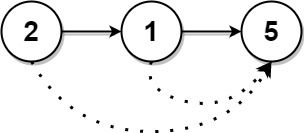| comments | difficulty | edit_url | rating | source | tags | ||||
|---|---|---|---|---|---|---|---|---|---|
true |
中等 |
1570 |
第 130 场周赛 Q3 |
|
给定一个长度为 n 的链表 head
对于列表中的每个节点,查找下一个 更大节点 的值。也就是说,对于每个节点,找到它旁边的第一个节点的值,这个节点的值 严格大于 它的值。
返回一个整数数组 answer ,其中 answer[i] 是第 i 个节点( 从1开始 )的下一个更大的节点的值。如果第 i 个节点没有下一个更大的节点,设置 answer[i] = 0 。
示例 1:
输入:head = [2,1,5] 输出:[5,5,0]
示例 2:
输入:head = [2,7,4,3,5] 输出:[7,0,5,5,0]
提示:
- 链表中节点数为
n 1 <= n <= 1041 <= Node.val <= 109
题目要求找到链表中每个节点的下一个更大的节点,即找到链表中每个节点的右边第一个比它大的节点。我们先遍历链表,将链表中的值存入数组
我们从后往前遍历数组
如果此时栈为空,则说明当前元素没有下一个更大的元素,否则当前元素的下一个更大的元素就是栈顶元素,更新答案数组
遍历结束后,返回答案数组
时间复杂度
# Definition for singly-linked list.
# class ListNode:
# def __init__(self, val=0, next=None):
# self.val = val
# self.next = next
class Solution:
def nextLargerNodes(self, head: Optional[ListNode]) -> List[int]:
nums = []
while head:
nums.append(head.val)
head = head.next
stk = []
n = len(nums)
ans = [0] * n
for i in range(n - 1, -1, -1):
while stk and stk[-1] <= nums[i]:
stk.pop()
if stk:
ans[i] = stk[-1]
stk.append(nums[i])
return ans/**
* Definition for singly-linked list.
* public class ListNode {
* int val;
* ListNode next;
* ListNode() {}
* ListNode(int val) { this.val = val; }
* ListNode(int val, ListNode next) { this.val = val; this.next = next; }
* }
*/
class Solution {
public int[] nextLargerNodes(ListNode head) {
List<Integer> nums = new ArrayList<>();
for (; head != null; head = head.next) {
nums.add(head.val);
}
Deque<Integer> stk = new ArrayDeque<>();
int n = nums.size();
int[] ans = new int[n];
for (int i = n - 1; i >= 0; --i) {
while (!stk.isEmpty() && stk.peek() <= nums.get(i)) {
stk.pop();
}
if (!stk.isEmpty()) {
ans[i] = stk.peek();
}
stk.push(nums.get(i));
}
return ans;
}
}/**
* Definition for singly-linked list.
* struct ListNode {
* int val;
* ListNode *next;
* ListNode() : val(0), next(nullptr) {}
* ListNode(int x) : val(x), next(nullptr) {}
* ListNode(int x, ListNode *next) : val(x), next(next) {}
* };
*/
class Solution {
public:
vector<int> nextLargerNodes(ListNode* head) {
vector<int> nums;
for (; head; head = head->next) {
nums.push_back(head->val);
}
stack<int> stk;
int n = nums.size();
vector<int> ans(n);
for (int i = n - 1; ~i; --i) {
while (!stk.empty() && stk.top() <= nums[i]) {
stk.pop();
}
if (!stk.empty()) {
ans[i] = stk.top();
}
stk.push(nums[i]);
}
return ans;
}
};/**
* Definition for singly-linked list.
* type ListNode struct {
* Val int
* Next *ListNode
* }
*/
func nextLargerNodes(head *ListNode) []int {
nums := []int{}
for ; head != nil; head = head.Next {
nums = append(nums, head.Val)
}
stk := []int{}
n := len(nums)
ans := make([]int, n)
for i := n - 1; i >= 0; i-- {
for len(stk) > 0 && stk[len(stk)-1] <= nums[i] {
stk = stk[:len(stk)-1]
}
if len(stk) > 0 {
ans[i] = stk[len(stk)-1]
}
stk = append(stk, nums[i])
}
return ans
}/**
* Definition for singly-linked list.
* class ListNode {
* val: number
* next: ListNode | null
* constructor(val?: number, next?: ListNode | null) {
* this.val = (val===undefined ? 0 : val)
* this.next = (next===undefined ? null : next)
* }
* }
*/
function nextLargerNodes(head: ListNode | null): number[] {
const nums: number[] = [];
while (head) {
nums.push(head.val);
head = head.next;
}
const stk: number[] = [];
const n = nums.length;
const ans: number[] = Array(n).fill(0);
for (let i = n - 1; ~i; --i) {
while (stk.length && stk.at(-1)! <= nums[i]) {
stk.pop();
}
ans[i] = stk.length ? stk.at(-1)! : 0;
stk.push(nums[i]);
}
return ans;
}// Definition for singly-linked list.
// #[derive(PartialEq, Eq, Clone, Debug)]
// pub struct ListNode {
// pub val: i32,
// pub next: Option<Box<ListNode>>
// }
//
// impl ListNode {
// #[inline]
// fn new(val: i32) -> Self {
// ListNode {
// next: None,
// val
// }
// }
// }
use std::collections::VecDeque;
impl Solution {
pub fn next_larger_nodes(head: Option<Box<ListNode>>) -> Vec<i32> {
let mut nums = Vec::new();
let mut current = &head;
while let Some(node) = current {
nums.push(node.val);
current = &node.next;
}
let mut stk = VecDeque::new();
let n = nums.len();
let mut ans = vec![0; n];
for i in (0..n).rev() {
while !stk.is_empty() && stk.back().copied().unwrap() <= nums[i] {
stk.pop_back();
}
if let Some(&top) = stk.back() {
ans[i] = top;
}
stk.push_back(nums[i]);
}
ans
}
}/**
* Definition for singly-linked list.
* function ListNode(val, next) {
* this.val = (val===undefined ? 0 : val)
* this.next = (next===undefined ? null : next)
* }
*/
/**
* @param {ListNode} head
* @return {number[]}
*/
var nextLargerNodes = function (head) {
const nums = [];
while (head) {
nums.push(head.val);
head = head.next;
}
const stk = [];
const n = nums.length;
const ans = new Array(n).fill(0);
for (let i = n - 1; i >= 0; --i) {
while (stk.length && stk[stk.length - 1] <= nums[i]) {
stk.pop();
}
ans[i] = stk.length ? stk[stk.length - 1] : 0;
stk.push(nums[i]);
}
return ans;
};
